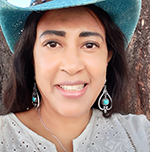By Barrett Holman Leak

SAN DIEGO — The prophet Habakkuk’s cry resonates powerfully with our modern anxieties. He opens with a visceral plea to God, grappling with the pervasive injustice he witnesses. “How long, O Lord, will I call, and You not hear? I cry out to You of violence, and You do not save.” (Habakkuk 1:2). He is not mincing his words and being socially polite. His anguish, his yearning for divine intervention and righteous judgment, echoes our profound distress in a nation grappling with systemic injustices that seem to multiply.
As the weekend opened, San Diego was stunned by a massive ICE raid on a South Park Italian restaurant. The owner was slammed to the wall, and every employee in the restaurant was handcuffed and held until they could produce proof that they were American citizens or had a work permit. Fully armed, masked ICE officers in camouflage uniforms threw flash bangs, which exploded into burning, terrifying smoke all around San Diegans who stood on the sidewalks screaming in anger and horror. San Diego Mayor Todd Gloria has contacted the Department of Homeland Security in objection to what was done.
This added to what we are already dealing with in our lives. Today, we confront the raw wound of anti-Black racism, deeply embedded in our institutions and society, denying dignity and opportunity. We see the insidious rise of antisemitism, the ancient hatred finding new and alarming expression, including shooting us down in the street because we are Jewish.
The very autonomy of women over their bodies is being eroded by government control, a profound violation of personal liberty and human dignity. Economically, the chasm between the rich and the poor yawns ever wider, as wealth appears to be siphoned from the vulnerable to swell already overflowing coffers. And chillingly, the foreigners in our land, those seeking refuge and a better life, are too often met with inhumane treatment like the Buono Forchetta ICE raid, a stark betrayal of our supposed values.
In the face of such overwhelming brokenness, Habakkuk’s prayer, “In the midst of the years revive it” (Habakkuk 3:2), becomes our own fervent cry. This is not a passive wish, but a desperate and hopeful plea for divine intervention, a re-awakening of moral consciousness and righteous action. It is about waking us up from spiritual decline and to disabuse us of the false notions deluding us in regard to who we are as God’s people. As Jews, this call for revival speaks directly to our core responsibilities.
Our foundational principle of Tzedek, Tzedek Tirdof – “Justice, justice you shall pursue” (Deuteronomy 16:20) – is not merely a suggestion, but a divine imperative. It demands that we actively work towards a society where fairness and equity are not just ideals but lived realities. This means confronting anti-Black racism not just with words, but with active anti-racist work, challenging discriminatory systems and championing restorative justice. It means standing as fierce allies against antisemitism, educating, advocating, and building bridges of understanding.
The idea of government control over women’s bodies is a profound affront to Tzelem Elokim – the Divine image in which every human being is created. This value insists on the inherent dignity and autonomy of each individual. For Jews, bodily autonomy is deeply rooted in our legal and ethical traditions. To deny a woman control over her reproductive choices is to deny her full personhood and to undermine her fundamental right to self-determination. Our faith compels us to fight for the rights of all individuals to make decisions about their own bodies, free from coercion and control.
When the rich dramatically enrich themselves at the expense of the poor, we are reminded of the Torah’s numerous injunctions against economic exploitation and its profound concern for the vulnerable. Concepts like Pe’ah, Leket, and Shik’chah (leaving corners of fields unharvested, forgotten sheaves, and gleanings for the poor) are not quaint historical footnotes, but blueprints for an economic system that prioritizes human need over unrestrained profit. We are commanded to care for the widow, the orphan, and the stranger, echoing the plight of those experiencing financial distress today.
And regarding the inhumane treatment of foreigners in our land, our tradition is unequivocal. The Torah reiterates 36 times, “You shall not oppress a stranger, for you know the feelings of the stranger, having yourselves been strangers in the land of Egypt” (Exodus 23:9). This commandment to treat the ger (foreigner/stranger) with empathy and dignity is central to our Jewish identity. As Jews, we are not to support and glorify those who call human beings “illegal” and label them as criminals because they are of a different nationality. We, who have known the pain of displacement and persecution throughout history, are morally obligated to extend compassion and welcome to those seeking refuge and a new home. To deny basic human rights, to separate families, or to allow inhumane conditions is a profound desecration of this core Jewish value.
Habakkuk’s vision culminates in God’s mighty acts, a reminder that divine justice ultimately prevails. But this does not absolve us of our responsibility. As Jews, we are called to be God’s partners in bringing about this justice. This Shavuot, as we celebrate the reception of Torah, let us internalize Habakkuk’s plea. Let us pray for revival, and then let our prayers transform into action. Let us pursue justice and fairness for women, the poor, the marginalized and the foreigner/stranger; champion dignity; protect autonomy, and extend compassion with unwavering commitment, ensuring that our lives reflect the Torah’s timeless call for a world redeemed. In the midst of these years of turmoil, may we be the agents of that holy revival.
*
Barrett Holman Leak is a freelance writer based in San Diego.